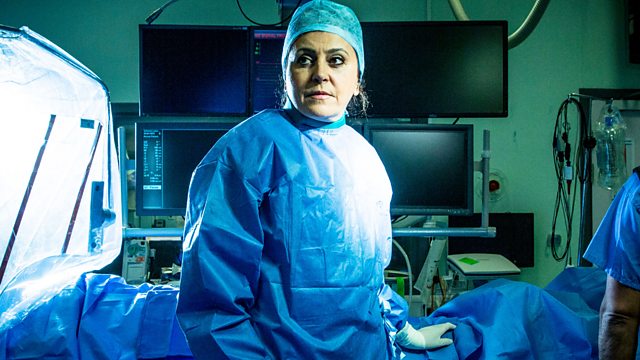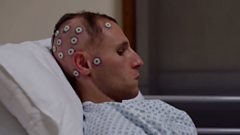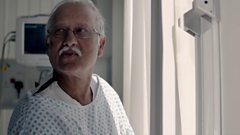
How staff at Imperial College Healthcare NHS Trust are pushing the boundaries of what is possible technologically, at a time when savings need to be made across the board.
With access to two key specialities, cardiology and neurosurgery, this episode explores how staff at Imperial College Healthcare NHS Trust are pushing the boundaries of what is possible technologically, at a time when the Trust has a planned annual deficit of 拢41 million and savings need to be made across the board.
Almost ten years ago, the Trust centralised its cardiology services at Hammersmith Hospital and established one of the UK's foremost specialist heart attack centres, or HACs. London Ambulance Service brings Eddie, a 56-year-old city worker suffering a severe heart attack, to the HAC where he is treated immediately in one of the cath labs. Eddie's doctor, consultant cardiologist Iqbal Malik comments: "I'm very clear that today he was dead if he hadn't ended up with us and had gone to a smaller hospital where they didn't have a cath lab." Since a London-wide network of eight heart attack centres was established over the last decade, death rates from the most serious heart attacks have halved in the capital. But this year, the cardiology service still needs to make savings of 拢3 million this year across the cardiac department. "It gets to the point when there is no meat left on the bone," comments Gill Bleeze, a senior cardiac nurse.
The cardiology team at Hammersmith also deal with rare and life-threatening heart conditions. Twenty-three-year-old primary school teacher Rosa has an infection on her mitral valve called endocarditis. Rosa is is an extremely complex case, as some infected tissue from her heart has broken off causing strokes in her brain. "It's the last thing you want to see in a young person, it carries a high mortality," says consultant cardiologist Susan Connolly. "It's one of the most challenging things we treat because the timing of surgery is crucial. If you don't get the timing of surgery right, the patient will die." It takes specialists from both the cardiology and neurosurgery departments to work out the least risky time to operate on Rosa - will they wait for the damage in her brain to subside and risk further tissue from the heart breaking off causing more strokes, or risk operating sooner with the chance she might have a big brain bleed on the table?
Meanwhile, at Charing Cross Hospital, site of the Trust's specialist neurosurgery department, 28-year-old former dancer Ben needs an operation to remove a recurrent brain tumour. "It's very frustrating treating brain tumour patients like Ben where he's had surgery and his tumour's come back," says consultant neurosurgeon Kevin O'Neill. However, as Kevin explains: "These days, as opposed to his previous surgery which was four years ago we have more tools in the box." Kevin will use 3D imaging to locate Ben's tumour, as well as leading diagnostic technology. "We're also developing new tools. I think we are now starting to make advances. With innovations it's going to open a whole new world of research and treatment options".
Last on
Clips
-
![]()
Pre brain surgery
Duration: 02:11
-
![]()
"You just don't know when it comes to the heart"
Duration: 02:53
-
![]()
"It's so weird to just sit here and feel completely normal"
Duration: 02:06
Credits
| Role | Contributor |
|---|---|
| Executive Producer | Lorraine Charker Phillips |
| Executive Producer | Simon Dickson |
| Executive Producer | Jackie Waldock |
| Series Producer | Tom Currie |
| Series Producer | Gilly Greenslade |
| Production Company | Label1 Television Ltd |
Explore extensive resources and information on healthcare and nursing with The Open University
Visit the Open University website.



